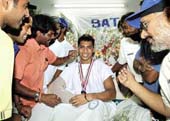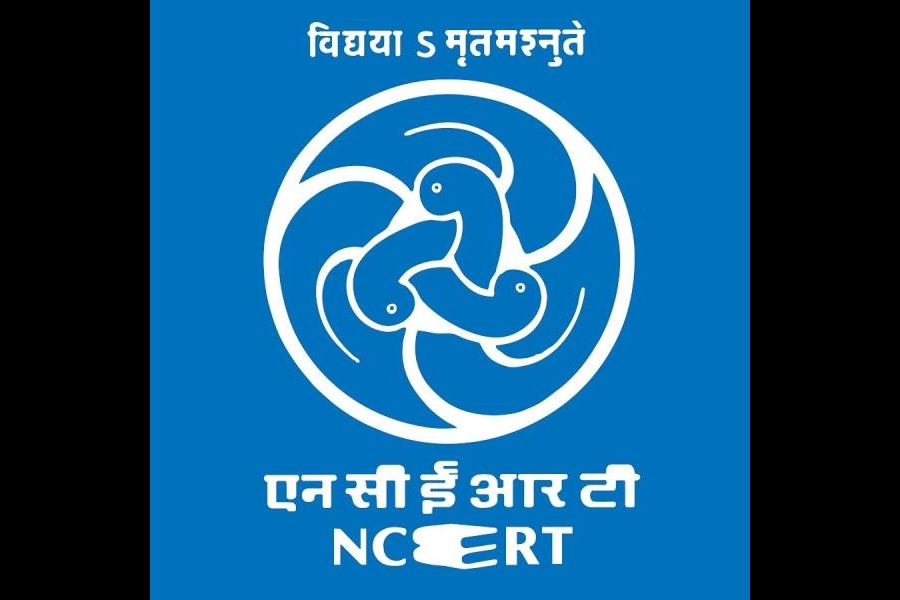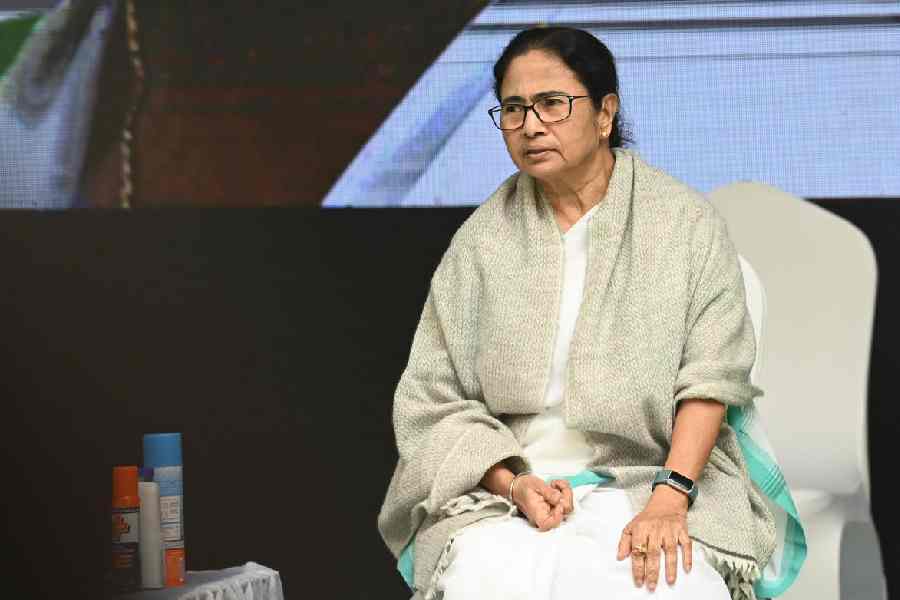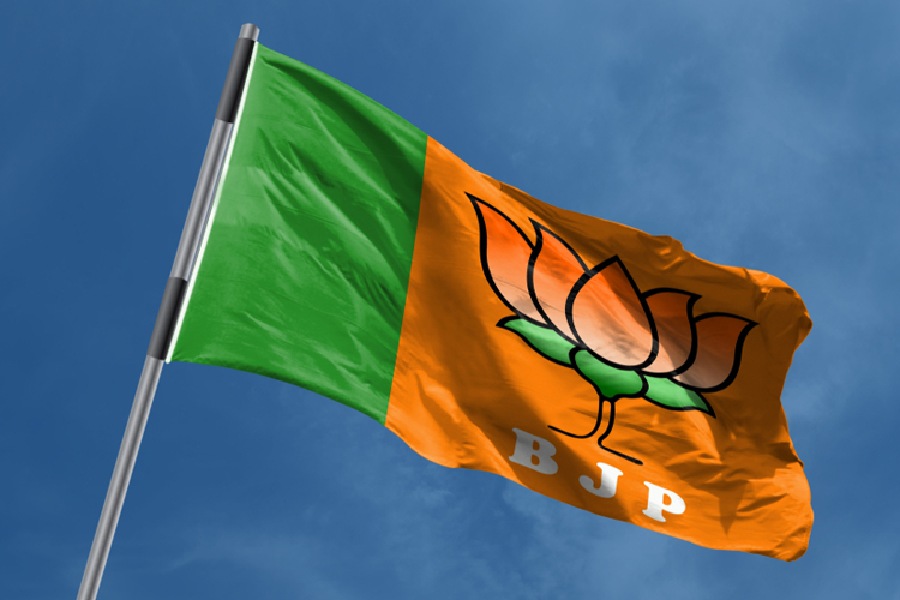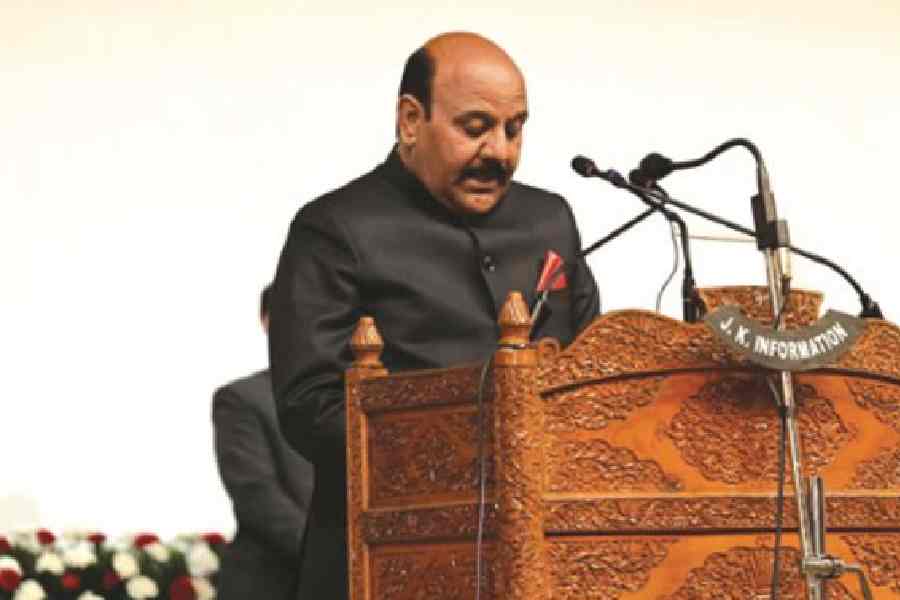 |
| India captain Dhanraj Pillay and teammates visit the injured Jugraj Singh at a hospital in New Delhi on Tuesday, following their win over Pakistan in the Asia Cup final. Each player garlanded a tearful Jugraj with their medals and Pillay presented him a replica of the trophy. (AFP) |
What a great relief it was to see India break the Asia Cup jinx and crown themselves champions in Kuala Lumpur! I must say they were worthy winners, the way they kept improving with every outing. We lost 2-4 to Pakistan in the league phase, then we were trailing against South Korea in the semi-final before eking out a convincing 4-2 victory. Even in the final, Pakistan’s 2-1 advantage was quickly neutralised and eventually wiped out.
It was really heart-warming to see the Indian team rally from deficits and disappointments time and again, and ultimately rise to the occasion at crunch hour. Far too many times in the last decade or so have our boys squandered the initiative in the dying stages to lose matches they should have won. In Kuala Lumpur, they reversed that unhealthy trend by striking crucial late goals in both the semis and final. That, for me, was the biggest gain for Indian hockey from the Asia Cup.
The turning point in the campaign was the conquest of Korea. One has lost count of the number of times the Koreans have overrun us in the last decade and a half. Even in Kuala Lumpur the other day, India trailed by a goal at the halfway stage despite dominating exchanges and creating opportunities. Just when it seemed we were headed for another defeat, the equaliser was struck. Then came a flurry of goals in the final minutes which buried the Koreans. Once this difficult hurdle was crossed, the team went into the final believing that none could stop them, not even the Pakistanis.
It was India’s first victory over Korea after the 1998 Bangkok Asian Games. But I must put this achievement in perspective by pointing out that this is the weakest Korean team I have seen in many, many years. They did show traditional fighting qualities and were supremely fit too, but the dominance they exerted over India and Pakistan throughout the Nineties was clearly missing.
The Koreans are actually going through a rebuilding process. They prepared a young team for the Asian Games and Olympics which Seoul hosted in the second half of the 1980s. That set of players gave the country yeoman service for well over a decade but their time is up. A bunch of youngsters has replaced the old guard but will take time to develop and mature into a world-class unit.
Coming back to the Indian performance in Kuala Lumpur, there wasn’t any particular individual who stood out from the rest. In that context, the triumph can be labelled as an efficient team effort.
Goalkeeper Devesh Chauhan let in three soft goals in the first clash against Pakistan but then had two good outings in the semi-final and final. Both full-backs — Dilip Tirkey and Kanwalpreet Singh — were workmanlike without being outstanding. They have to cut out their long, aimless hits and concentrate on supplying meaningful passes to the midfielders. Kanwalpreet, in particular, has this unwise habit of scooping the ball without any purpose. He has to be told that scoops can’t be used to ease the pressure all the time.
The half-backs played good hockey in patches. Baljit Saini showed signs of recapturing his old form, while Ignace Tirkey did a lot of overlapping and scored goals too. I have no problems with a medio overlapping from time to time and functioning as a forward, but left-half Ignace was doing it too often and going into a dribbling spree. This can lead to serious trouble, especially against fast-moving European teams.
The forwardline failed to combine as a cohesive unit, till the final. The biggest letdown in the tournament were the two seniors, Dhanraj Pillay and Baljit Dhillon. As far as I am concerned, these two experienced campaigners should play the role of game-makers, leaving the job of running up front and scoring to Gagan Ajit Singh, Deepak Thakur, Prabhjot Singh and Sandeep Michael. With an important assignment like the Olympic qualifiers coming up after the Azlan Shah tournament, Dhanraj and Dhillon have to start contributing to the team cause soon.
Did we miss Jugraj Singh? Yes, of course, very much so — both in taking penalty corners and defending them. The drag-flick is the most effective way of converting penalty corners these days and, till the time Jugraj is fit to be back on field, we must train someone who can take this shot skilfully.
Our stopping of penalty corners was very weak as well. The lion-hearted Jugraj had learnt to frustrate even the fearsome Sohail Abbas. Now, in his absence, the coach has to earmark a guy and teach him Jugraj’s skills vis-à-vis blocking penalty corners.
Despite the Asia Cup triumph, Indian hockey still has some rough edges to iron out. The last thing we want now is a fresh problem. The clash between captain and coach, over Dhanraj’s interaction with the media before a press conference in Chennai, was most unfortunate, to say the least.
I quite agree with Rajinder that players should focus only on their game, but blaming the media for disturbing players is not right. I firmly believe that in a team game like hockey or cricket, none should be allowed to write columns or speak to TV channels just before or during a tournament. In fact, a clear code of dos and don’ts should be set up by the authorities and players should be told to strictly follow it.
But till the time such a code is drawn up, Rajinder and Dhanraj must restrain themselves. For the sake of team and country.

